ACCA考试技巧:P1 Professional Accountant
- 格式:doc
- 大小:58.46 KB
- 文档页数:3

ACCA(特许公认会计师)考试是一项严肃的考试,需要充分备考和掌握答题技巧。
下面是一些建议的ACCA答题技巧:
1. 仔细阅读题目:在回答问题之前,仔细阅读题目,确保完全理解问题的要求和背景信息。
这有助于你确定应该关注哪些方面,并避免不必要的错误。
2. 分配时间:ACCA考试通常有时间限制,因此重要的是合理分配时间。
将更多的时间分配给难度较大的问题,同时确保留出足够的时间来检查和修改答案。
3. 使用关键词:当回答问题时,使用关键词来表明你理解了问题的要点。
这有助于向考官展示你的专业知识,并确保你的答案与问题相关。
4. 结构化回答:在写作答案时,使用清晰的结构,包括引言、主体段落和总结。
这样可以使你的答案更易读并且更有逻辑性。
5. 考虑标准答案:在备考过程中,了解ACCA考试的标准答案非常重要。
这可以帮助你了解考官对问题的期望,并确保你的答案与标准答案一致。
6. 练习模拟试题:通过做大量的模拟试题,可以熟悉ACCA考试的题型和格式,并提高答题速度和准确性。
同时,这也有助于发现自己的弱点并加以改进。
7. 注意语法和拼写:在书面答题中,正确的语法和拼写非常重要。
花一些额外的时间来检查和修正语法错误和拼写错误,以确保你的答案更加专业和可读。
以上是一些建议的ACCA答题技巧,希望对你的备考有所帮助。
记住,不断练习和深入理解考试内容是取得好成绩的关键。
祝你考试顺利!。
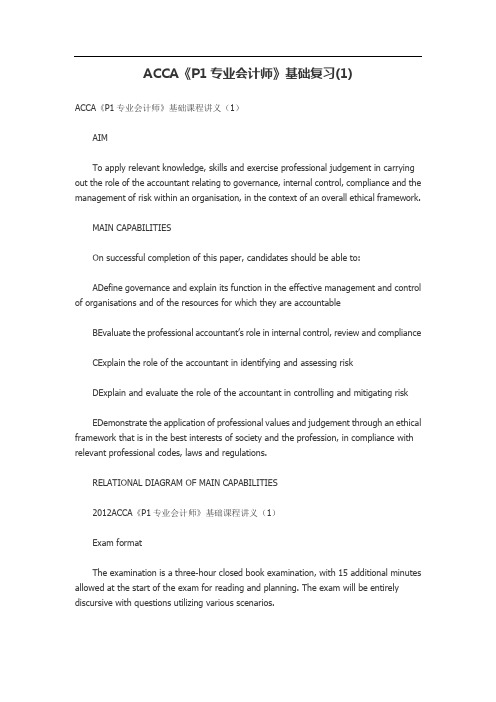
ACCA《P1专业会计师》基础复习(1)ACCA《P1专业会计师》基础课程讲义(1)AIMTo apply relevant knowledge, skills and exercise professional judgement in carrying out the role of the accountant relating to governance, internal control, compliance and the management of risk within an organisation, in the context of an overall ethical framework.MAIN CAPABILITIESOn successful completion of this paper, candidates should be able to:ADefine governance and explain its function in the effective management and control of organisations and of the resources for which they are accountableBEvaluate the professional accountant’s role in internal control, review and complianceCExplain the role of the accountant in identifying and assessing riskDExplain and evaluate the role of the accountant in controlling and mitigating riskEDemonstrate the application of professional values and judgement through an ethical framework that is in the best interests of society and the profession, in compliance with relevant professional codes, laws and regulations.RELATIONAL DIAGRAM OF MAIN CAPABILITIES2012ACCA《P1专业会计师》基础课程讲义(1)Exam formatThe examination is a three-hour closed book examination, with 15 additional minutes allowed at the start of the exam for reading and planning. The exam will be entirely discursive with questions utilizing various scenarios.The exam will contain two sections. Section A will contain Question 1, which will be worth a total of 50 marks and which will be compulsory. It will include several distinct tasks (listed as (a),(b),(c),etc)and will sample the syllabus quite broadly. Question 1 might contain elements of governance, risk, internal control, and will include some aspect of ethics.One of the features of the Professional level exam paper is the awarding of‘professional marks’。
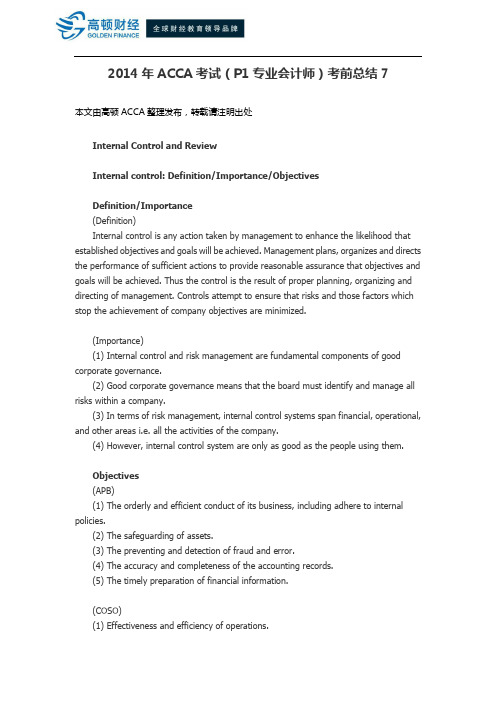
2014年ACCA考试(P1专业会计师)考前总结7本文由高顿ACCA整理发布,转载请注明出处Internal Control and ReviewInternal control: Definition/Importance/ObjectivesDefinition/Importance(Definition)Internal control is any action taken by management to enhance the likelihood that established objectives and goals will be achieved. Management plans, organizes and directs the performance of sufficient actions to provide reasonable assurance that objectives and goals will be achieved. Thus the control is the result of proper planning, organizing and directing of management. Controls attempt to ensure that risks and those factors which stop the achievement of company objectives are minimized.(Importance)(1) Internal control and risk management are fundamental components of good corporate governance.(2) Good corporate governance means that the board must identify and manage all risks within a company.(3) In terms of risk management, internal control systems span financial, operational, and other areas i.e. all the activities of the company.(4) However, internal control system are only as good as the people using them.Objectives(APB)(1) The orderly and efficient conduct of its business, including adhere to internal policies.(2) The safeguarding of assets.(3) The preventing and detection of fraud and error.(4) The accuracy and completeness of the accounting records.(5) The timely preparation of financial information.(COSO)(1) Effectiveness and efficiency of operations.(2) Reliability of financial reporting.(3) Compliance with applicable laws and regulations.Roles in risk managementResponsibility for internal control is not simply an executive management role. All employees have some responsibility for monitoring and maintaining internal controls.(1) Board of directors: Ensuring adequacy and effectiveness of internal control system.(2) Senior executive management: Setting internal control policies; Monitoring effectiveness of internal control system.(3) Heads of business units: Establishing specific internal control policies and procedures.(4) All employees: Operating and adhering to internal controls.Elements/Components of internal control system (COSO framework)Control Environment(1) It describes the ethics and culture of the organization, which provide a framework with which other aspects of internal control operate.(2) It is the attitude and actions of the board and management regarding the significance of control within the organization.(3) It provides the discipline and structure of the achievement of the primary objectives of the system of internal control.(4) It includes: (a) management’s philosophy and operating style; (b) organization structure; (c) Assignment of authority and responsibility; (d) human resources policies and practices; (e) competence of personnel.Risk Assessment(1) There is a connection between the objectives of an organization and the risks to which it is exposed.(2) The risks involved in achieving those objectives should be identified and assessed.(3) Risk assessment should form the basis for deciding how the risks should be managed.Control Activities(1) These are policies and procedures that ensure that the decisions and instructions of management are carried out.(2) Control activities include: (a) authorizations; (b) verifications; (c) reconciliations; (d) approvals; (e) segregation of duties; (f) performance reviews etc.(3) These control activities are commonly referred to as internal controls.Information and Communication(1) An organization must gather information and communicate it to the right people.(2) Managers need both internal and external information to make decision.(3) The quality of information systems is a key factor.Monitoring(1) The internal control system must be monitored.(2) This element of an internal control system is associated with internal audit.(3) It is important that deficiencies in the internal control system should be identified and reported up to senior management and the board of directors.Internal audit(1) Internal audit is an appraisal or monitoring activity established by management and directors for the review of the accounting and internal control systems as a service to the entity.(2) Internal audit functions by examining, evaluating and reporting to management and directors on the adequacy and effectiveness of components of the accounting and internal control systems.(3) Internal audit is a management control. It reviews the effectiveness of other controls within a company.(4) The work of audit is varied – from reviewing financial controls through checking compliance with legislation.(5) The internal audit department is normally under the control of a chief internal auditor who reports to the audit committee.(Importance)(1) In some situation, it is a statutory requirement to have internal audit.(2) In some situation, it is required to have internal audit by codes of corporate governance.(3) Internal audit provides an independence check on the control systems in a company.(4) Internal audit is a management control.更多ACCA资讯请关注高顿ACCA官网:。
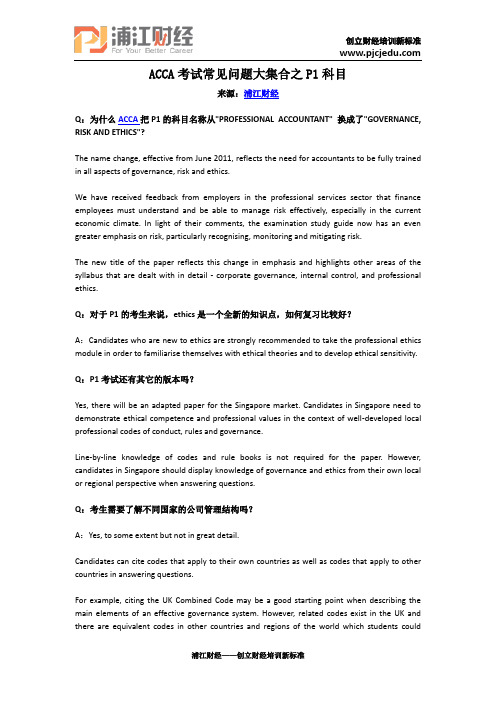
ACCA考试常见问题大集合之P1科目来源:浦江财经Q:为什么ACCA把P1的科目名称从"PROFESSIONAL ACCOUNTANT" 换成了"GOVERNANCE, RISK AND ETHICS"?The name change, effective from June 2011, reflects the need for accountants to be fully trained in all aspects of governance, risk and ethics.We have received feedback from employers in the professional services sector that finance employees must understand and be able to manage risk effectively, especially in the current economic climate. In light of their comments, the examination study guide now has an even greater emphasis on risk, particularly recognising, monitoring and mitigating risk.The new title of the paper reflects this change in emphasis and highlights other areas of the syllabus that are dealt with in detail - corporate governance, internal control, and professional ethics.Q:对于P1的考生来说,ethics是一个全新的知识点,如何复习比较好?A:Candidates who are new to ethics are strongly recommended to take the professional ethics module in order to familiarise themselves with ethical theories and to develop ethical sensitivity.Q:P1考试还有其它的版本吗?Yes, there will be an adapted paper for the Singapore market. Candidates in Singapore need to demonstrate ethical competence and professional values in the context of well-developed local professional codes of conduct, rules and governance.Line-by-line knowledge of codes and rule books is not required for the paper. However, candidates in Singapore should display knowledge of governance and ethics from their own local or regional perspective when answering questions.Q:考生需要了解不同国家的公司管理结构吗?A:Yes, to some extent but not in great detail.Candidates can cite codes that apply to their own countries as well as codes that apply to other countries in answering questions.For example, citing the UK Combined Code may be a good starting point when describing the main elements of an effective governance system. However, related codes exist in the UK and there are equivalent codes in other countries and regions of the world which students couldmention. The study guide specifically mentions the Sarbanes-Oxley Act, as this rules-based legislation has international application.Gaining a broad knowledge and understanding and developing the ability to critically evaluate the key principles of these codes is more important than learning the precise wording or a detailed knowledge of their content and clauses.Q:当考生在支持或者反对某种观点时,需要举例吗?A:Yes, markers will be looking for evidence of understanding and examples can provide them with this.Q:“ETHICAL KNOWLEDGE”和“ETHICAL THEORY”的区别在哪里?A:Candidates are expected to know and to be able to reference "ethical theory". They should then be able to discuss the theory and build a case as to how it may be applied in practice; this is "ethical knowledge."In studying the Professional ethics module, candidates may fully recognise for the first time that issues do not always have clear-cut solutions or answers.Q:P1考生想多拿分挺难,因为考生都没有按照答题思路来答,有什么好的建议吗?A:Marks are awarded for presentation and the logical construction of an answer. It is important for students to become familiar with the formats and approaches (eg annual report, memo, letter) which they may need to utilise in the exam.Candidates should also be aware of the types of answers required when questions use the verbs "assess", "analyse", "evaluate" and "criticise".Q:题干里会出现“critically evaluate”an approach,这是什么意思?This means to evaluate the approach of someone or something, but at the same time to criticise or find fault with it. This form of requirement is intended to test a candidate's ability to produce a cogent and coherent argument, with which they may or may not agree.Q:写答案在答题纸上有什么好的建议吗?It is important to clearly state the question number at the top of the page and indicate the question part near the margin. This will even more important when computerised marking comes in.Q:考生需要在解释要点时举道德难题的例子来得分吗?A:Getting candidates to learn how to apply aspects of the P1 syllabus to real situations is quite a challenge for tuition providers. Many P1 questions require the candidate to deconstruct a situation and examine the issues contained within them. It is therefore very good practice to examine current news stories which cover issues related to the P1 syllabus.There are lots of good materials available in the media and on the internet, particularly at the moment when there are rapidly-changing economic conditions. The challenge for tuition providers is providing relevant, local examples which will capture their candidates' interest and stimulate them to discuss and think about issues covered in P1.Q:很多ACCA考生都不是以英语为母语的,许多国家及地区的考生对于环境审计这样的概念并不是很了解,对此ACCA协会有什么举措吗?A:Examiners and markers are very aware that many candidates are writing in their second or third language. They are very sympathetic to this and are actively looking to award marks.With respect to environmental issues, though, part of the purpose of Paper P1 is to raise awareness of environmental audits. The syllabus covers the tension between issues of corporate governance and commercial pressures.Q:考试会要求考生举行业相关的例子吗?A:Specific examples can be useful to illustrate a certain level of understanding. Questions could be based on examples from specific industries.Q:P1的计算难度如何?考生需要带计算器吗?A:Numbers may be used in an exam question to help enable the analysis of an issue. P1 is not a numerical paper but numerical information can be used as an example.Candidates might need a calculator. There is the option of including numerical content in an answer if it will help to demonstrate understanding of particular point. But there will be no complicated arithmetic.Q:在2010年12月的P1考试中,有道题的题干使用了动词”explore”,这个动词并没有出现在考纲的list of verb上,可以解释一下这个词是什么意思吗?还有其它不在考纲上的动词会出现在卷子上吗?A:The list is not an exhaustive list and the verbs on it are intended to be examples.The word 'explore' gives flexibility to the examiner and the markers since it implies that there are different approaches to answering the question. We are not trying to trip up candidates andany appropriate approach here would be given credit.'Explore' is quite a forgiving word which gives the candidates a certain latitude in approaching the question. Markers are very keen to reward appropriate responses.浦江财经创立财经培训新标准,专业师资团队打造专业财经培训!。
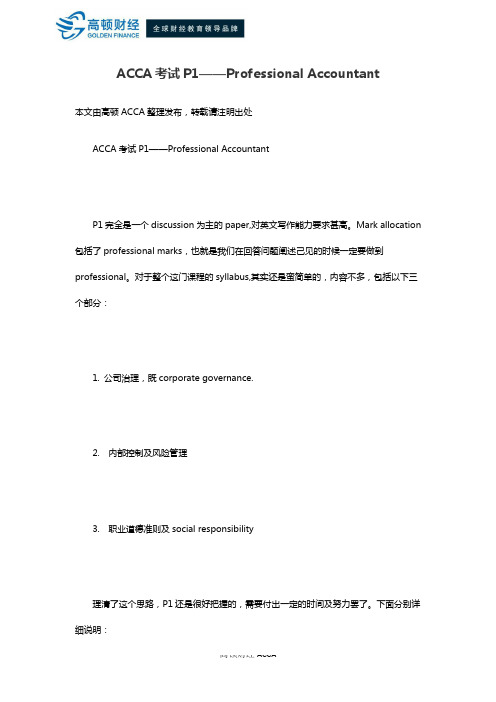
ACCA考试P1——Professional Accountant本文由高顿ACCA整理发布,转载请注明出处ACCA考试P1——Professional AccountantP1完全是一个discussion为主的paper,对英文写作能力要求甚高。
Mark allocation 包括了professional marks,也就是我们在回答问题阐述己见的时候一定要做到professional。
对于整个这门课程的syllabus,其实还是蛮简单的,内容不多,包括以下三个部分:1. 公司治理,既corporate governance.2. 内部控制及风险管理3. 职业道德准则及social responsibility理清了这个思路,P1还是很好把握的,需要付出一定的时间及努力罢了。
下面分别详细说明:1.公司治理这个部分包括的东西比较的杂,需要强化记忆的不多,但是应用是非常重要的,ACCA 的考官喜欢问我们某个公司现在存在什么样的公司治理问题,这个就要求我们能够立刻想到Codes of Corporate Governance中对不同的方面的不同要求,然后在case 中进行应用。
主要需要记忆的部分包括:CG的基本原则各个Sub-committee的不同要求,包括人数、role以及qualification等,包括audit committee, remuneration committee, nomination committee还有risk committee非执行董事的职责、特点以及要求(Higgs Report 2003中说明的4点:Strategy, Scrutiny, Risk, People)Stakeholder Groups(stakeholder matrix),不同的分类,只有我们了解了这些基本的stakeholder,才能做出最符合职业道德的判断Agency theory,这个没有什么难点,就是理解的问题。
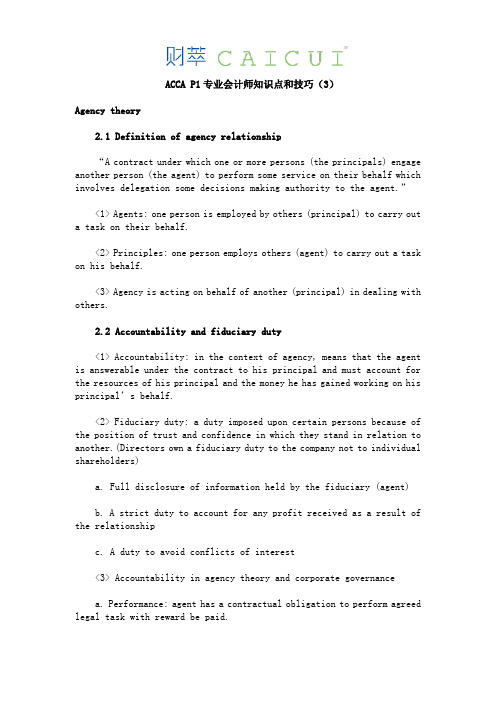
ACCA P1专业会计师知识点和技巧(3)Agency theory2.1 Definition of agency relationship“A contract under which one or more persons (the principals) engage another person (the agent) to perform some service on their behalf which involves deleg ation some decisions making authority to the agent.”<1> Agents: one person is employed by others (principal) to carry outa task on their behalf.<2> Principles: one person employs others (agent) to carry out a task on his behalf.<3> Agency is acting on behalf of another (principal) in dealing with others.2.2 Accountability and fiduciary duty<1> Accountability: in the context of agency, means that the agent is answerable under the contract to his principal and must account for the resources of his principal and the money he has gained working on his principal’s behalf.<2> Fiduciary duty: a duty imposed upon certain persons because of the position of trust and confidence in which they stand in relation to another.(Directors own a fiduciary duty to the company not to individual shareholders)a. Full disclosure of information held by the fiduciary (agent)b. A strict duty to account for any profit received as a result of the relationshipc. A duty to avoid conflicts of interest<3> Accountability in agency theory and corporate governancea. Performance: agent has a contractual obligation to perform agreed legal task with reward be paid.b. Obedience: agent must act strictly in accordance with his principal’s la wful and reasonable instruction.c. Skill: agent should maintain the standard of professional skill and care.d. Personal performance: agent owes a duty to perform his task himself and not to delegate, except a few special circumstances (required by law, etc)e. No conflict of interest: agent owes a duty not to conflict of interest with his principal.f. Confidentiality: agent must keep confidence with principal’s affairs even after the agency relationship has ceased.g. Benefit: agent must hand over all benefit to his principal unless it is allowed to retain.2.3 Agency in the context of corporate governance2.4 Agency problems and agency costs<1> Agency problems in delegationa. The principal and agent have a conflict of interest, or they have different attitude in risk management.b. It is difficult and expensive for the principal to verify what the agent is actually doing (introduce mechanisms to control; spend time, money and resource to monitor).<2> Agency costsa. The principal spend time, money and resources to monitor the activities of agents. (Information Asymmetry)b. To introduce mechanisms to control the activities of the agent<3> Resolving the agency problem: alignment of interesta. Profit-relate pay / economic value added payb. Reward manager with shares: management buy-in/buy-out, managers become joint owner-managers.c. Executive share option (ESOPs): increase in company value lead to increase in share price.d. Monito ring mechanisms (monitor mangers’ behavior): NEDs, management audit, additional report, and significant shareholder engagement.2.5 Transaction costs theory<1> Definition: companies try to keep as many transactions as possible in-house (vertical integration) in order to reduce uncertainties about dealing with suppliers (purchase price and quality).a. Search and information costs (find the supplier)b. Marketing, bargaining and decision costs (purchase component)c. Policing and enforcement costs (monitor quality)<2> Relationship with agency theorya. Difference: transaction costs theory focus on opportunistic; agency theory focus on agency problem and costsb. Similar: they all deal with conflict of interest, managers should pursue shareholders’ best interests rather than their own。
上海总部地址:上海市虹口区花园路171号A3幢高顿教育
电话:400-600-8011 网址:
ACCA P1的复习方法和考试注意事项
本文由高顿
ACCA 整理发布,转载请注明出处 ACCA P1的复习方法和考试注意事项
复习时:
1. 应该把每个章节的重要知识点都覆盖,不要有遗漏。
看我总结出的4个部分4个图,把每个图中重要知识点自己填充。
2. 把过去考题或练习册看两遍,尽可能背些重要点(不要背段落,背短语),因为完全考试是发挥是没有时间的。
尽可能背,万一忘了再发挥。
3. 动手写几道题,看看时间控制,和练习写作。
考试时:
1.控制好时间,第一道大题大约一个半小时+ 阅读题15分钟。
后面3选2,每道题45分钟,算好时间,保证每一问都答才能保证通过。
选题时可只看题目是否熟悉,选有信心的题做,可以不看案例,以节省时间。
2. 注意问题的动词,比如:construct the case for 是支持他的观点原因, critically evaluate 是正反两说,先说同意原因是,再说反对原因是。
Criticize 是批判。
3. 保证你的答案尽量联系到考题案例中去,结合案例去答,不要只答你怎么背的。
4.自习阅读问题后再做答,不要所答非所问。
5.注意professional mark,语言表述,格式等。
更多ACCA 资讯请关注高顿ACCA 官网:。
中公财经培训网:/
acca备考相当重要,如果你备考的方式或者方法不对。
那么你在一开始的时候就失败了。
所以说备考的方法与侧重点很重要。
那么对于P1这个P阶段的第一门课程,我们在备考中需要注意的事项有哪些呢?其实,主要有两点;
站在管理层的角度,将知识点烂熟于心
相对来说,由于是P系列的第一门课程,所以P1在难度方面并不是很高,知识点也较为有限,这就使得每年的考试中重复率都较高。
这对考生来说无疑是一件好事,因为这意味着只要将有限的知识点反复研究到烂熟于心你就已经成功了一半。
此外,P1中关于道德的内容有些偏向于哲学,考生们切忌死记硬背,本身语言已经是硬伤,再去死记这些晦涩的内容只会把考试变得复杂。
我们需要做的是理解其中的逻辑关系,这样才能灵活运用。
还有一点,P1中公司治理与组织框架的内容是建立在科目F8的基础上的,但是又不全然等同于F8的内容,因此就不能按照F8的做题逻辑去答题。
值得明确的一点是,应对P1的题目时,你应该是站在一个管理者的角度去分析问题。
在老师的例子中听出门道
大部分学员都参加了ACCA的培训课程,这对学习ACCA是极其有帮助的。
中公财经的ACCA讲师都是有着丰富工作经验的学霸,上课过程中经常会讲到自己的一些工作经历和在工作中遇到的问题,有时候还会讲讲段子。
学员们千万不要听过算过!
要知道,P1的知识对于没有实战经验的学员们来说始终是局限在书本上的,但老师讲的这些看似与课本无关其实才是宝贝啊!你可以不再只是想象那些抽象的知识点,导致最后只能生硬地吸收概念。
切记!老师讲这些并不是在扯淡,而是有意为之,就看听者是否“有心”了!。
ACCA考试《专业会计师P1》复习详解3本文由高顿ACCA整理发布,转载请注明出处Non-executive DirectorsRole & Purpose(1)Strategy Role. Non-executive directors should contribute tostrategy success, challenging strategy, and offering advice on direction.(2)Scrutiny Role. Non-executive directors should scrutinize theperformance of executive management. They should represent the shareholders’interests to ensure agency issues don’t arise to reduce shareholder value.(3)Risk Role. Non-executive directors should ensure the company has arobust system of internal controls and system of risk management in place.(4)People Role. Non-executive directors should be responsible forappointing & removing senior managers, and determining appropriate levelsof remuneration for executives.IndependenceNon-executive directors should beindependent-minded, which means exercising objective judgment in the bestinterests of the corporation whatever the consequences for the directorpersonally. Non-executive directors should provide a balancing influence, andplay a key role in reducing conflicts of interest between management andshareholders.(Why)(1)Providing a detached and objective view of board decisions.(2)Providing shareholders with an independent voice on the board.(3)Reducing self-interest in the behavior of executives.(4)Providing expertise and communicate effectively.(How)(1)Non-executive directors should have no business, financial or otherconnection with the company except director’s fee and shareholdings.(2)Cross-directorships are a particular threatto independence of non-executive directors. It is where an executive directorof firm A is a non-executive director of firm B, and an executive director offirm B is a non-executive director of firm A.(3)Non-executive directors should not take part in share option schemeand their service should not be pensionable.(4)Appointment of non-executive directors should be for a specifiedterms and reappointment should not be automatic.Advantages/disadvantages(Advantages)(1)Non-executive directors provide independent element on the board.It implies that they have the detachment to be able to monitor the company’saffairs effectively.(2)Non-executive directors may have experiences and knowledge whichexecutive directors don not have. It expands the resources available formanagement to use.(3)Non-executive directors may improve the communication betweenshareholders and company and are often a comfort factor for third party such ascreditors.(4)Non-executive directors can provide wider perspective, andinstitutional perception is enhanced.(Disadvantages)(1)Non-executive directors may have difficulty imposing their viewsupon the board.(2)Non-executive directors face the problem of limited time that theycan devote to their role.(3)Non-executive directors may damage company performance by weakeningboard unity and stifling entrepreneurship.(4)Poor remuneration might lead people don’t want t he job of beingnon-executive director. On the other hand, high-caliber non-executive directorsmay gravitate towards the best-run companies rather than companies which aremore in need of input from good non-executives.更多ACCA资讯请关注高顿ACCA官网:。
对于很多的小伙伴来说,想要通过P阶段专业性质的acca考试,没有一个全面的准备是不行的。
当然在此之前,别人的成功备考经验也很重要。
下面中公财经小编就给大家介绍一下吧;2018年是ACCA的改革年,从9月考季开始使用新大纲,P阶段调整较大,P1/P3合并为SBL,P2更名为SBL!而P1/P3合并后考试费也相应作出调整,6月考季P1P3考试费用分别还是原来的?132(常规阶段),合并后的SBL考试费用为?190(常规阶段);SBR费用未变。
准备6月考季备考P1的,这里中公财经小编就给大家介绍一下来自大陆第一的学习方法和经验技巧。
学习历程和方法P1课程是P阶段的第一门课,考试题型也与之前几门都不同,这让我一开始就对P1十分重视。
学校授课后,我会参照老师提供的PPT回顾知识点,梳理一遍思路,确保吃透了PPT上的内容后,再看网课,从另一个角度去理解、补充知识,并在这样反复的学习和回顾中不断加深对知识点的印象,培养起对关键词的敏感度。
我个人一向不擅长死记硬背,所以在学习过程中,我更注意理解,把握知识点背后的逻辑性,思考“为什么”来补充知识,串联知识,也加深印象。
这样也有利于培养发散性的思维和联想能力,把知识点串联起来,形成自己记忆的思维图,在答题时会有更多选择也更有条理。
把握逻辑比背诵更重要,记忆可能会被遗忘,但思考的路径和方式不会改变,就像数学公式,背不下来也可以自己推导。
在最后的冲刺阶段,由于时间紧张,我也主要把重点放在了重温知识点、梳理思路上,并没有看很多真题。
只有在考试当天上午,看了几道老师提到的题目,看一下问题,在内心确认一下涉及的知识点,比照一下答案看看自己答题的方向对不对就可以了,还要注意考前要看的是报告的格式。
就我个人而言,考前几小时已经不适合复习了,应该清醒意识,厘清思路,把握答题方法和格式。
考试和答题考试最重要的是时间管理,拿到试题后先大致浏览选做题的各小问,确认考察的知识点各是哪个方面,自己对这方面的掌握如何,确定要选择的两道题。
ACCA考试技巧:P1 Professional Accountant
本文由高顿ACCA整理发布,转载请注明出处
Kaplan
50-markscenario question, to include ethics, Tucker’s 5 questions, single v.
two-tierboard structures, corporate social responsibility.
Optionalquestions to include importance of internal controls, governance committees andstructure of directors’ remuneration, business risks, integrated reporting andenvironmental reporting.
BPP
Weexpect that the P1 exam in June will reflect previous sittings closely, withone compulsory question and a choice of two from three optional questions.
Remember,the compulsory question will be fixed at 50 marks, focusing on one scenariotesting all three main syllabus areas, with up to 4 professional marksavailable for producing some form of written communication (a briefing note,press release or letter to shareholders).
Theoptional questions will score 25 marks each and can test up to two syllabusareas each by applying the syllabus to a real-world scenario.
TheDecember 2014 exam tested content from two areas added to the syllabus for thatsitting onwards – public sector governance and integrated reporting – so it isunlikely that you will see them tested again so soon, but make sure you haveread the examiner’s technical articles just in case.
Youcan also expect to see the use of ethical and CSR theories applied toscenarios, as well as the use of risk and governance syllabus content – youshould be aiming to revisit as many past-paper questions as possible as we arestarting to see exam requirements that reflect those we have seen before.
Candidatesshould also take heed of the examining team’s recently published articlecontent for P1 when preparing for this exam – at time of going to press, thisincluded one article on CSR strategy and strategic CSR –so keep checking tomake sure you don’t miss any last minute additions.
LSBF
Governance
1.Purpose of governance codes
2.Unitary/two tier
3.Chair role/CEO chair split
4.Performance appraisal
5.Reward systems
6.AGM/insider dealing
ply and explain
8.Rules vs principle
Control
9.COSO failures
10.Board responsibility for control
11.Disclosure/information
Risk Management
12.Risk committee or risk manager
13.Strategic/operational risk
14.Static and dynamic risk
15.Risk diversification/embedded risk
16.ALARP
17.Risk assessment
Ethics
18.Absolute/relative
19.Professionalism
20.AAA model or Tucker
更多ACCA资讯请关注高顿ACCA官网:。